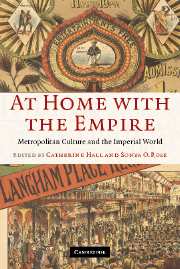Book contents
- Frontmatter
- Contents
- Notes on contributors
- 1 Introduction: being at home with the Empire
- 2 At home with history Macaulay and the History of England
- 3 A homogeneous society? Britain's internal ‘others’, 1800–present
- 4 At home with the Empire: the example of Ireland
- 5 The condition of women, women's writing and the Empire in nineteenth-century Britain
- 6 Sexuality and empire
- 7 Religion and empire at home
- 8 Metropolitan desires and colonial connections: reflections on consumption and empire
- 9 Imagining empire: history, fantasy and literature
- 10 New narratives of imperial politics in the nineteenth century
- 11 Bringing the Empire home: women activists in imperial Britain, 1790s–1930s
- 12 Taking class notes on empire
- 13 Citizenship and empire, 1867–1928
- Select bibliography
- Index
9 - Imagining empire: history, fantasy and literature
Published online by Cambridge University Press: 11 April 2011
- Frontmatter
- Contents
- Notes on contributors
- 1 Introduction: being at home with the Empire
- 2 At home with history Macaulay and the History of England
- 3 A homogeneous society? Britain's internal ‘others’, 1800–present
- 4 At home with the Empire: the example of Ireland
- 5 The condition of women, women's writing and the Empire in nineteenth-century Britain
- 6 Sexuality and empire
- 7 Religion and empire at home
- 8 Metropolitan desires and colonial connections: reflections on consumption and empire
- 9 Imagining empire: history, fantasy and literature
- 10 New narratives of imperial politics in the nineteenth century
- 11 Bringing the Empire home: women activists in imperial Britain, 1790s–1930s
- 12 Taking class notes on empire
- 13 Citizenship and empire, 1867–1928
- Select bibliography
- Index
Summary
How did imaginative literature make the Empire both vivid and legible to readers in Britain? In what ways did the language and narratives of fiction, poetry and other popular genres – from travel writing to anti-slavery polemic – represent the everyday relations of metropole and colony, of domestic and imperial subjects? What sort of dreams and nightmares did they evoke? In thinking about the shifting role which literary production has played in the imaginative construction of the Empire at home across two centuries this chapter will argue for the uses of literature by historians, by drawing on two exemplary instances from discrete historical periods – the critical decades leading up to and following the abolition of colonial slavery in 1834 and the years from the 1950s through to the millennium. In the first and much more detailed case, it will explore some of the ways in which the colonial connection was imagined in fiction and in anti-slavery writing up to and after the abolition of colonial slavery. The British campaign to end slavery was never free of hierarchical distinctions – historians and critics have long noted the ordering of peoples and cultures immanent in the imaginative and polemical literature associated with it. Less recognised perhaps is that in the two decades following abolition literary texts also played a central role in a retrospective critique of the Christian humanitarianism and/or liberal universalism that had inspired an earlier radical moment.
- Type
- Chapter
- Information
- At Home with the EmpireMetropolitan Culture and the Imperial World, pp. 191 - 211Publisher: Cambridge University PressPrint publication year: 2006
- 5
- Cited by

